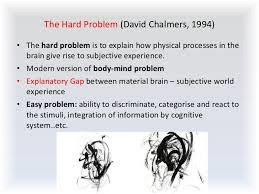
David Chalmers' Book The Conscious Mind and The Hard Problem
Although called the father of modern philosophy, René Descartes became challenged in the last century for the split he created between body and mind, the mind-body dualism, or subject and object. For him, body became one thing; mind, another. This presents a problem. Why? Hold out your hand. Open the fist. Now close it. How did the gap get bridged between your hand, the object, and mind, the subject, if the two are split? Yet, the one and the other are somehow in relationship. This is one problem for understanding consciousness and it implicates other problems. In particular, David Chalmers has become widely-known and quoted for a key issue he presents to philosophers and neuro-researchers in the field.
Well-known for his phrase on the "hard problem," as in the article title above, Chalmers’ ideas can be found in his The Conscious Mind: In Search of A Fundamental Theory, among other books. In that work, he puts the hard problem in this manner: "Why is all this processing accompanied by an experienced inner life?" Put differently, he seeks an objective explanation for subjective experience. Some would argue that he can't get there from here--"here" being subjectivity. They would say that physical models can help elucidate consciousness processes, but ultimately "what it feels like to be me" cannot be explained. I am one of them. Still, he offers an interesting and intelligent discussion. Here is part of it.
He introduces processing this way: “Many books and articles on consciousness have appeared in the past few years, and one might think that we are making progress. But on a closer look, most of this work leaves the hardest problems about consciousness untouched. Often, such work addresses what might be called the ‘easy’ problems of consciousness: How does the brain process environmental stimulation? How does it integrate information? How do we produce reports of internal states? But to answer them is not to solve the hard problem: Why is all this processing accompanied by an experienced internal life?”
The problem is compounded by the term consciousness. It is rather slippery and must be handled with care. He observes that sometimes it refers to
- “cognitive capacity, such as to introspect or to report one’s mental states;
- “awakeness”;
- “our ability to focus attention and to voluntarily control behavior”;
- “to know about something.”
He points out that each of these are “accepted uses of the term, but all pick out phenomena distinct from the subject I am discussing, and phenomena that are significantly less difficult to explain.” When he refers to consciousness he means “the subjective quality of experience; what it is like to be a cognitive agent.”
That is truly a hard problem.
Not satisfied with Daniel Dennett’s explanations (Consciousness Explained, Elbow Room, and other titles), he has this to say: "Dennett spends much of his book [Consciousness Explained] outlining a detailed cognitive model, which he puts forward as an explanation of consciousness. On the face of it, the model is centrally a model of the capacity of a subject to verbally report a mental state. It might thus yield an explanation of reportability, of introspective consciousness, and perhaps of other aspects of awareness, but nothing in the model provides an explanation of phenomenal consciousness. . . . "
Note phenomenal. In the book's chapter "Two Concepts of Mind" he extensively distinguishes between phenomenal and psychological concepts.
In his closing comments of the book, he indicates the viewpoints he favors. Here are two of them, both in the same paragraph:
- “I resisted mind-body dualism for a long time, but I have now come to the point where I accept it, not just as the only tenable view but as a satisfying view in its own right. It is always possible that I am confused, or that there is a new and radical possibility that I have overlooked; but I can comfortably say that I think dualism is very likely true.”
- “I have also raised the possibility of a kind of panpsychism. Like mind-body dualism, this is initially counterintuitive, but the counter-intuitiveness disappears with time. I am unsure whether the view is true or false but it is at least intellectually appealing, and on reflection is not too crazy to be acceptable.”


No comments:
Post a Comment
Note: Only a member of this blog may post a comment.